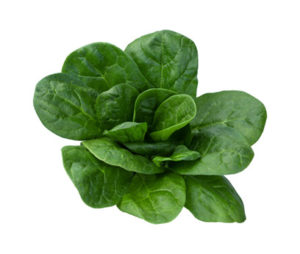Was Popeye Right?
Author: Dr. Stephen Chaney
 You may have seen the recent headlines proclaiming that eating spinach will make you stronger. The more “mature” adults among my readers may remember the Popeye cartoons of our youth. Every time Popeye was on the brink of disaster he would down a can of spinach and become superhuman. Was Popeye right? Can spinach actually improve strength and endurance? Can you eat spinach for muscle growth? To answer those questions, I analyzed the study behind the headlines.
You may have seen the recent headlines proclaiming that eating spinach will make you stronger. The more “mature” adults among my readers may remember the Popeye cartoons of our youth. Every time Popeye was on the brink of disaster he would down a can of spinach and become superhuman. Was Popeye right? Can spinach actually improve strength and endurance? Can you eat spinach for muscle growth? To answer those questions, I analyzed the study behind the headlines.
The short answer is that there may be some truth to the headlines, but you would never be able to prove it from the study they quoted.
Even worse, this study and the headlines it generated are typical of the sports nutrition marketplace. There are far too many headlines and sports nutrition products based on weak and inconclusive studies.
Spinach for Muscle Growth?
 Let’s start at the beginning. In the first place the study behind the headlines (De Smet et al., Frontiers In Physiology, 7: 233-244, 2016) did not actually use spinach. In fact, participants were advised to avoid nitrate-rich foods like spinach and beets during the study.
Let’s start at the beginning. In the first place the study behind the headlines (De Smet et al., Frontiers In Physiology, 7: 233-244, 2016) did not actually use spinach. In fact, participants were advised to avoid nitrate-rich foods like spinach and beets during the study.
The study enrolled moderately-trained male students from the University of Leuven in Belgium. All the participants completed 5 weeks of sprint interval training (SIT) consisting of 30 second sprints followed by 4.5-minute recovery intervals on an exercise cycle. This was repeated 4-6 times per session 3 times per week.
One group took a sodium nitrate supplement containing 400 mg of nitrate 30 minutes before each workout. The other group received a placebo. There were only 9 students in each group. [I have simplified the study design for the purposes of this discussion. There were other aspects of the study, but they are not relevant to our discussion.]
The investigators measured maximum oxygen consumption (a measure of exercise efficiency and endurance), maximum power output during a 30-second sprint, and composition of quadriceps muscle fibers both before the 5-week training started and again when it was completed.
The results were disappointing:
 Nitrate supplementation caused a modest increase in fast twitch (type IIa) muscle fibers compared to placebo. That is a physiological response that may (or may not, depending on who you believe) allow high intensity exercise to be sustained for longer without fatigue.
Nitrate supplementation caused a modest increase in fast twitch (type IIa) muscle fibers compared to placebo. That is a physiological response that may (or may not, depending on who you believe) allow high intensity exercise to be sustained for longer without fatigue.- Nitrate supplementation failed to show any significant benefit for any other measure of exercise capacity. In particular, no effect of nitrate supplementation was observed on:
- Maximum oxygen consumption
- Maximum power output
- Peak heart rate
- Time to exhaustion.
- Various metabolic markers of exercise efficiency
In spite of these largely negative results, the authors concluded: “The current experiment demonstrated that oral nitrate supplementation during short-term sprint-interval training increased the proportion of type IIa muscle fibers, which may contribute to enhanced performance in short maximal exercise events…”
“May” is the operative word here. Their data did not provide any evidence that nitrate supplementation actually improved performance.
Online headlines (the kind of nutrition information most people read) took it a step further. For example, one headline claimed “Spinach Can Boost Your Physical Fitness and Muscle Strength.” That headline came out of thin air.
Sports Nutrition Myths
 Unfortunately, this study is typical of many of the sports nutrition studies I have reviewed over the years. Most of them are very small studies. In many of them only one or two measure exercise performance change, while other measures show no effect of supplementation.
Unfortunately, this study is typical of many of the sports nutrition studies I have reviewed over the years. Most of them are very small studies. In many of them only one or two measure exercise performance change, while other measures show no effect of supplementation.
That doesn’t stop bloggers from hyping the studies and creating sports nutrition myths. It also doesn’t stop companies from offering sports products with those ingredients and making outrageous claims about how their product will make you bigger, faster, and stronger. For example, a claim that you can eat spinach for muscle growth.
It is only when dozens of studies have been published, and a meta-analysis combines the data from all the studies that we are in a position to see whether any particular nutrient has a statistically significant effect on performance.
Must You Eat Spinach for Muscle Growth or Could Nitrates Provide Exercise Benefits?
 Despite the weakness of this particular study, there is reason to believe that nitrates might improve exercise performance.
Despite the weakness of this particular study, there is reason to believe that nitrates might improve exercise performance.
- There is a plausible mechanism. In the body nitrates are converted to nitric oxide, which improves arterial health, lowers blood pressure, and enhances blood flow. Increased blood flow to the muscles could enhance exercise efficiency.
- Other studies have come to a similar conclusion. There are several other exercise studies Health Benefits of Beetroot Juice involving supplements containing either nitrates or beetroot juice (which is rich in nitrates) that have suggested that supplementation improves exercise efficiency. Each of the studies are small and inconclusive by themselves, but in the aggregate they suggest that nitrate may have some benefits.
- Arginine, which also enhances nitric oxide production, is well established in the sports nutrition world. There are dozens of published exercise studies involving arginine and meta-analyses of these studies suggest that arginine provides modest benefits. However, there is an important caveat, which I shall explain below.
In short, the idea that nitrate supplementation might improve exercise performance is plausible. However, plausible is a long way from proven.
The Ultimate Irony
When you analyze the meta-analyses of arginine supplementation and exercise performance studies, the ultimate irony is that arginine supplementation is most effective for untrained individuals who are just beginning an exercise program. It provides little benefit for trained athletes (R. Bescos et al, Sports Medicine, 42: 99‐117,2012).
There is a logical explanation for this observation. Intense exercise also enhances nitric oxide production and blood flow to the muscle. Most highly trained athletes have already maxed their nitric oxide levels and have excellent blood flow to their muscles. Arginine (or nitrate) supplementation provides little additional benefit for them.
Why do I call this the ultimate irony? Think about it for a minute.
The people most likely to use sports supplements with arginine or nitrate are gym rats and highly trained athletes – the people who get the least benefit from those supplements.
The people least likely to use special sports supplements with arginine or nitrate are the weekend warriors and the busy professionals who are just trying to stay fit – the people who are most likely to benefit from those supplements.
The Bottom Line
- Recent headlines have suggested that you can eat spinach for muscle growth and exercise performance.
- When you look at the study behind the headlines, the study was done with nitrate, not with spinach. Spinach is a nitrate-rich food (as are beet roots), but the headlines were clearly misleading.
- The study was also inconclusive. It was a small study, and most parameters of exercise performance were not affected by nitrate supplementation.
- Unfortunately, this kind of small, inconclusive study is all too common in the sports nutrition literature. That doesn’t stop bloggers from hyping the studies and creating sports nutrition myths. It also doesn’t stop companies from offering sports nutrition products with those ingredients and making outrageous claims about how their product will make you bigger, faster, and stronger.
- However, other studies suggest the idea that nitrate in food or supplements could improve exercise performance is plausible.
- In our bodies, nitrate is converted to nitric oxide, which enhances blood flow to the muscles.
- Other studies with nitrate and with beetroot juice (an excellent source of nitrate) have shown some exercise benefits.
- Arginine, which is also converted to nitric oxide, is a fairly well established sports supplement.
Of course, plausible is a long way from proven.
- The ultimate irony is that the people most likely to use sports supplements with arginine or nitrates are gym rats and highly trained athletes. They already have excellent blood flow to their muscles. They are the people who get the least benefit from those supplements.
- In contrast, the people least likely to use special sports supplements with arginine or nitrates are the weekend warriors and the busy professionals who are just trying to stay fit. Those are the people who are most likely to benefit from those supplements.
These statements have not been evaluated by the Food and Drug Administration. This information is not intended to diagnose, treat, cure or prevent any disease.
